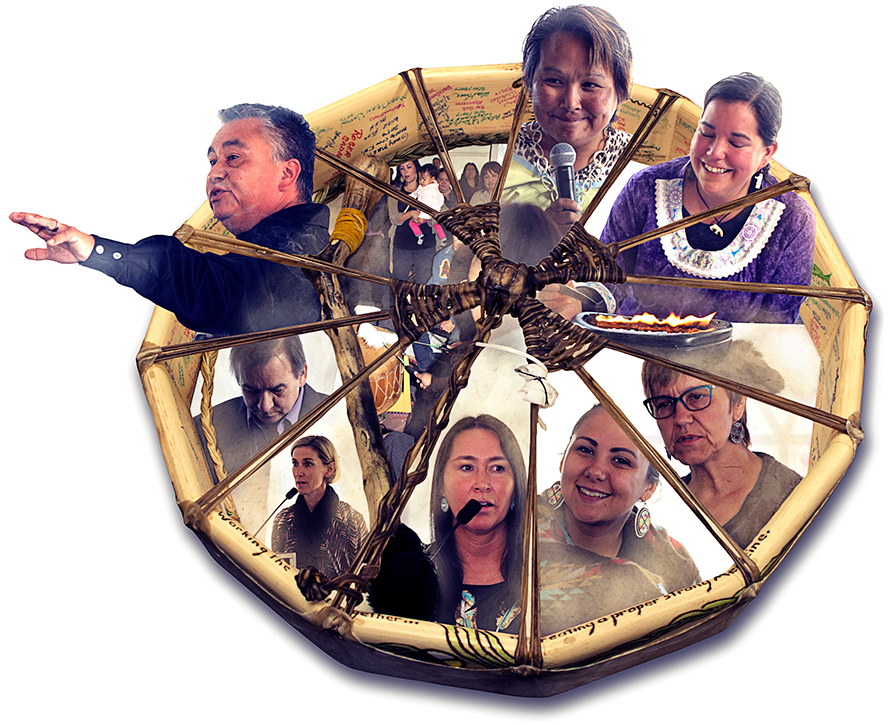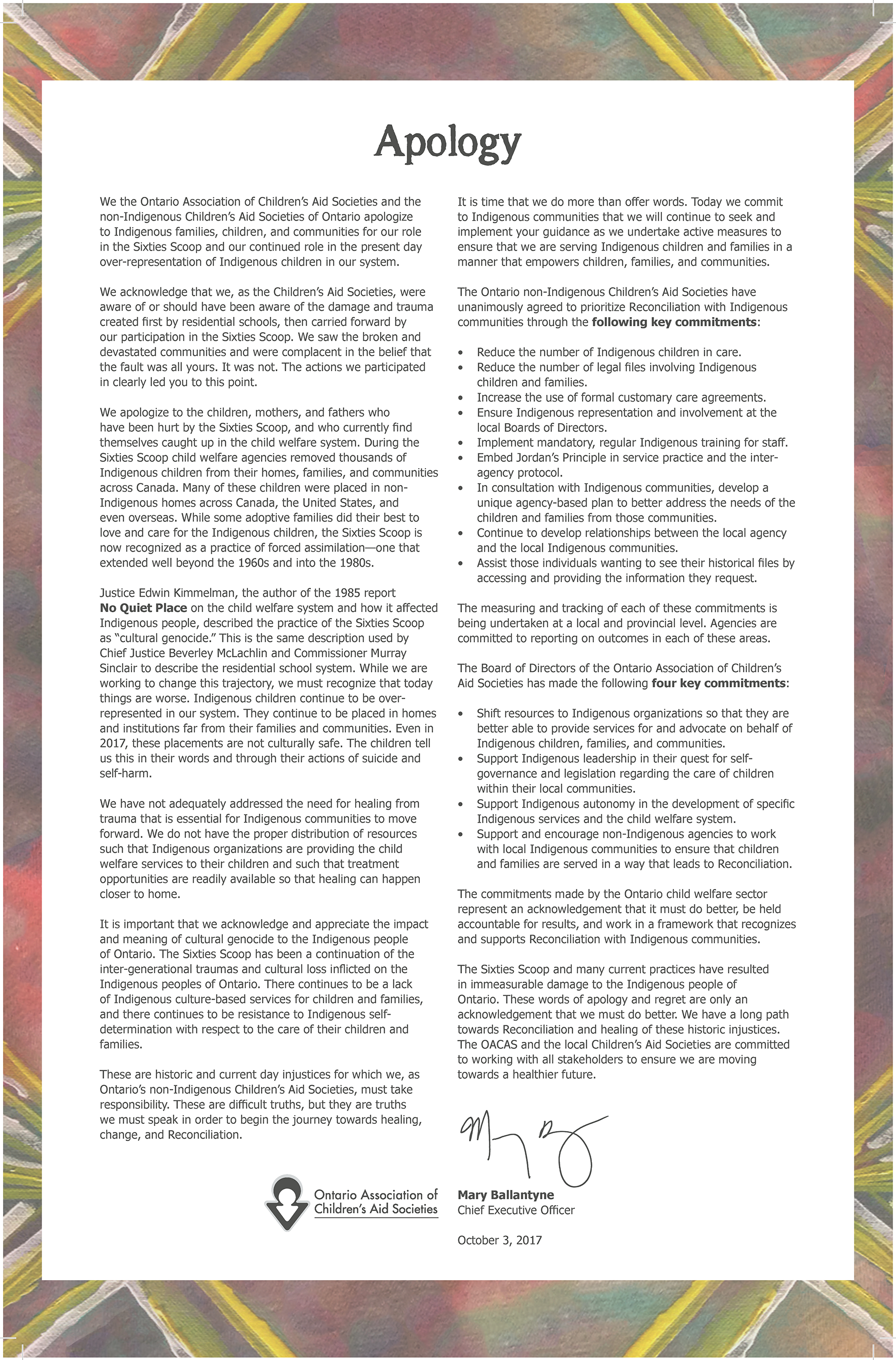
The drum pictured above was gifted to OACAS by Indigenous partners following “A Moment on the Path” gathering. The drum is signed on its inside rim by many of those who attended the gathering, and is intended to be a “tool” for OACAS members, staff, and Board members to use to help maintain focus on their Reconciliation commitments.
On October 1-3, 2017, OACAS hosted a gathering called “A Moment on the Path” at Geneva Park and Rama First Nation to acknowledge and apologize for the harmful role child welfare has played historically, and continues to play, in the lives of Ontario Indigenous children, families, and communities.
The gathering brought together representatives, leaders, and elders from Indigenous communities and Indigenous Child and Family Services with leaders from Ontario’s non-Indigenous child welfare agencies. The days spent at Geneva Park were deeply rooted in ceremony, with sweat lodges, a sacred fire, drums, lamp lighting, sunrise ceremonies, and prayers throughout, generously offered by Indigenous elders and leaders from across the province.
Indigenous participants—including survivors of the Sixties Scoop and Residential Schools—spoke about the devastating impact the child welfare system has had, and continues to have, on their communities. Chief Marcia Brown Martell, lead plaintiff in the Sixties Scoop lawsuit, Renee Linklater, and Rodney Howe all shared their experience of being apprehended by child welfare as part of the Sixties Scoop.
Mary Ballantyne, CEO of OACAS, apologized to all Indigenous children, families and communities who were impacted by the Sixties Scoop, and continue to be negatively impacted by the child welfare system in Ontario.
“We apologize to the children, mothers and fathers who have been hurt by the Sixties Scoop, which saw thousands of Indigenous children taken from their home, families and communities across Canada,” said Mary Ballantyne. “The Sixties Scoop and many current practices have resulted in cultural genocide for the Indigenous people of Ontario. The words of apology and regret I share today are an acknowledgement that we must do better. We have a long path towards Reconciliation and healing of theses historic injustices.”
Following the acknowledgment and apology, leaders and elders from Indigenous communities across the province were invited to respond. The apology was met with strong emotion and insistence that the words be matched by action and accountability.
OACAS presented nine key commitments the child welfare sector have unanimously agreed upon in order to move forward with Reconciliation:
- Reduce the number of Indigenous children in care.
- Reduce the number of legal files involving Indigenous children and families.
- Increase the use of formal customary care agreements.
- Ensure Indigenous representation and involvement at the local Board of Directors.
- Implement mandatory Indigenous training for staff.
- Change the inter-agency protocol to include Jordan’s Principle as a fundamental principle
- In consultation with Indigenous communities, develop a unique agency-based plan to better address the needs of the children and families from those communities.
- Continue to develop relationships between their local agency and the local Indigenous communities.
- Assist those individuals wanting to see their historical files by accessing and providing the information they request.
OACAS’ Board of Directors also made the following four commitments:
- Shift resources to Indigenous organizations so that they are better able to provide services for and advocate on behalf of Indigenous children, families, and communities.
- Support Indigenous leadership in their quest for self-governance and legislation regarding the care of children within their local communities.
- Support Indigenous autonomy in the development of specific Indigenous services and the child welfare system.
- Support and encourage non-Indigenous agencies to work with local Indigenous communities to ensure that children and families are served in a way that leads to Reconciliation.
View a Reconciliation timeline that follows the work OACAS and CASs have undertaken in the past years leading up to these commitments. Learn more about these commitments here.
OACAS and CASs will continue to report on the progress made on these commitments, with the recognition that actions speak louder than words.
“We have heard loudly and clearly that significant action on the part of Children’s Aid Societies and OACAS is needed if we are to move forward with Reconciliation,” said Mary Ballantyne. “We pledge to be held accountable and to make meaningful the words of the apology through transformed behaviour.”
Local CAS takes significant step forward toward Reconciliation
Each CAS’s journey towards Reconciliation with its local Indigenous communities will reflect the unique local histories and current realities. Last week, Sarnia-Lambton CAS took a significant step forward in its own Reconciliation journey, by signing a new agreement with the Aamjiwnaang First Nation. As part of the new protocol, Sarnia-Lambton CAS will consult with the First Nation on all matters involving its families and children. Decisions involving any necessary placement of its children will involve the community. The protocol states children who must leave their homes will remain in their community whenever possible, and if Aamjiwnaang children or youth are in CAS care, connections to their culture and community will be a priority. Read more about this important new protocol here.
60s Scoop Lawsuit Settlement
Three days following “A Moment on the Path” gathering, a historic agreement was reached in the 60s Scoop Lawsuit. The agreement will see the federal government pay between $500 and $800 million in restitution to Indigenous children who lost their cultural identities as the result of being removed from their families and communities during the 60s Scoop. Individuals will be compensated in the range of $25,000 – $50,000, depending on the number of claimants who come forward.
Watch Chief Marcia Brown Martell, lead plaintiff in the Sixties Scoop lawsuit, message regarding the settlement.
Read lead lawyer Jeffery Wilson’s Q & A regarding the details of the settlement.
Drum Ceremony
A drum, pictured above, was gifted to OACAS by Indigenous partners following “A Moment on the Path” gathering. Jackie Labonte and Oliver Nogisin, who have both offered guidance and wisdom to OACAS leadership throughout its Reconciliation journey, presented the drum to the OACAS Board. The drum is signed on its inside rim by many of those who attended the gathering, and is intended to be a “tool” for OACAS members, staff, and Board members to use to help maintain focus on their Reconciliation commitments.
